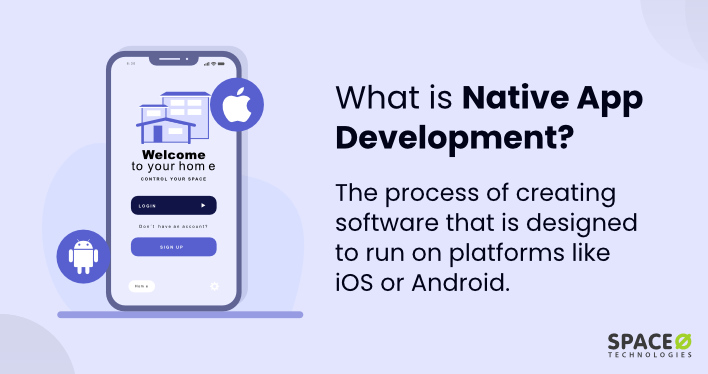

Native app development is the process of creating software applications for particular operating systems, such as iOS or Android, using dedicated programming languages and development tools. That means an iOS app will only work on iOS devices, and an Android application will only work on Android devices. Native app development maximizes app performance and user experience by taking advantage of the device’s hardware and software.
Unlike hybrid apps, which use a single codebase, native apps are platform-specific. Native apps surpass hybrid apps in speed, responsiveness, and user experience, making them ideal for high-performance and complex user interface applications.
More than the definition, if you want to learn the native app development process, and the tools required for the native app development, you can check out this complete guide on native mobile app development we wrote earlier.
Now, let’s discuss a few of the popular examples of native apps:
Native mobile app development company helps you build this type of native application from scratch.
Now, let’s discuss the benefits of developing native mobile applications for your business, instead of cross-platform application development.
Here are the benefits of native mobile app development.
Here are the limitations of native mobile app development.
Here is a table highlighting the difference between native mobile app development and cross-platform development.
| Aspects | Native App Development | Cross-platform Development |
|---|---|---|
| Development Languages | Uses platform-specific languages (Swift/Objective-C for iOS, Java/Kotlin for Android). | Uses languages like JavaScript, Dart, or C# that work across several platforms (React Native, Flutter, Xamarin). |
| Performance | High performance due to direct access to device hardware and platform-specific optimizations. | Good performance, but can be less optimized than native apps due to the additional abstraction layer. |
| User Experience | Superior, as it can fully leverage the native UI components and guidelines of each platform. | Consistent across platforms, but might not fully match the native look and feel of each platform. |
| Development Time and Cost | Higher, as separate development is required for each platform. | Lower, as a single codebase can be used for multiple platforms. |
| Maintenance | Can be higher due to the need to update and manage separate codebases for each platform. | Easier, as most of the code is shared across platforms, simplifying updates and bug fixes. |
| Access to Device Features | Full access to all device-specific features and capabilities. | Access to device features is possible but may require additional plugins or native modules. |
| Market Reach | Limited to specific platforms unless developed separately for each. | Wider, as the same app can be deployed across multiple platforms. |
As the table shows, native app development offers unique benefits, but it’s also important to consider cross-platform development as an alternative. If you are still in doubt or confused about which one is the best, you can check out this comparison guide on native app development vs cross-platform development. It thoroughly examines the benefits and limitations of both approaches to assist you in making a well-informed decision.
In conclusion, native app development involves creating applications exclusively for mobile operating systems like iOS or Android using their unique programming languages. These high-quality apps are costly and time-consuming to develop since each device type requires a different version.
To address this, native app developers need to start with a basic version of the app and gradually enhance it. The decision between native and more universal app development is influenced by the app’s purpose audience, and available resources. Each strategy offers advantages, and the selection should be based on the purposes and objectives of the project.

Bhaval Patel is a Director (Operations) at Space-O Technologies. He has 20+ years of experience helping startups and enterprises with custom software solutions to drive maximum results. Under his leadership, Space-O has won the 8th GESIA annual award for being the best mobile app development company. So far, he has validated more than 300 app ideas and successfully delivered 100 custom solutions using the technologies, such as Swift, Kotlin, React Native, Flutter, PHP, RoR, IoT, AI, NFC, AR/VR, Blockchain, NFT, and more.